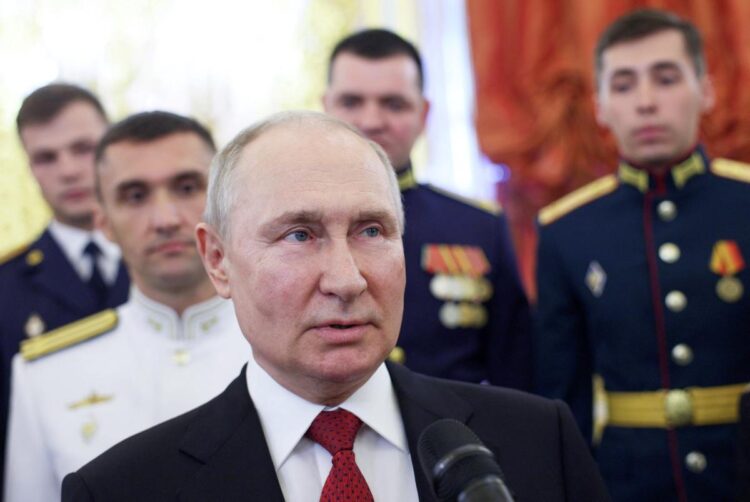A 2020 attempt by Russian agents to target and kill a CIA asset on U.S. soil signals a major shift in how the U.S. intelligence community assesses the threat faced by foreign informants who are vital to U.S. intelligence gathering.
Earlier this week, The New York Times revealed an unprecedented attempt by Moscow to pursue Aleksandr Poteyev, a former high-ranking Russian intelligence officer turned informant for the CIA who was living in Miami.
According to information set to be released in a book later this month by Calder Walton, a scholar of national security and intelligence at Harvard University, titled “Spies: The Epic Intelligence War Between East and West,” an operation was put into motion in a “modern-day Mercader” — a reference to Ramón Mercader, a secret agent of the Soviet Union under Josef Stalin who assassinated Leon Trotsky in Mexico City in 1940.

Russia has a long and notorious reputation for targeting informants at home and abroad, including in Western nations. In one well-documented case from 2018, Sergei and Yulia Skripal were poisoned with a nerve agent in Salisbury, England.
But according to Rebekah Koffler, a Russian-born former DIA intelligence officer who worked with the CIA’s National Clandestine Service on operational projects involving defectors and author of “Putin’s Playbook,” Moscow going after a U.S. asset on American soil is “a game changer.”
“We have many people working for us who risk their lives… in Russia providing really highly sensitive information. In certain cases, we exfiltrate them when their life is in danger when their cover is blown,” she told Fox News Digital. “This is a game changer.”
The former intelligence officer explained that the U.S. intelligence community goes to great lengths to ensure the safety and security of informants forced to flee their homeland and seek protection within U.S. borders in exchange for their intelligence services.

“If they attempted to kill this guy, they’re going to attempt to kill our other guys that we have here,” she explained.
Koffler, who has personally been a target of Russian harassment, said the U.S. intelligence community previously assessed that while Moscow has intimidated Russians who aid Washington, the threat level against assets and within U.S. borders was still believed to be relatively low — an assessment that is no longer accurate.
PRO-KREMLIN WRITER’S CAR EXPLODES IN RUSSIA, KILLING DRIVER
“It’s a very alarming development,” she said. “We just realized none of these people are safe anymore, and that’s very disturbing.”
The plot to assassinate Poteyev was foiled after a Kremlin asset botched a surveillance scheme that attracted the attention of a security guard, which alerted the U.S. intelligence community.
Russia attempted to gain information on Poteyev by forcibly recruiting an unassuming Mexican scientist, Hector Alejandro Cabrera Fuentes.
Fuentes was found to have two wives, one a Russian living in Germany with two daughters, and the other living in Mexico — a peculiar arrangement that Moscow exploited.
The mother of two was stopped and prevented from leaving Russia after they returned for a visit, forcing Fuentes to travel to Russia to see them.
While there he was approached by a man believed to be a Russian agent and was eventually instructed to rent an apartment in Miami under a different name near where Poteyev was believed to live.

He was then told to do surveillance and locate Poteyev’s vehicle, copy down the description of where it was kept and take its license plate number.
Fuentes was also reportedly told not to take a picture of the car.
But the scientist blew the operation when he tried to enter a complex where Poteyev’s vehicle was believed to be kept, passing through an entry gate by tailgating the car in front of him.
Fuentes was then stopped by a security guard, at which point his wife walked away from the scene, located Poteyev’s car and took a picture of it — all of which was captured on security camera footage, according to reporting by The New York Times.
Koffler pointed out that the failure of Russia’s assassination attempt demonstrated that security procedures the U.S. intelligence community has in place to keep defectors safe are working.
“We may need to invest more resources now that we know the Russians will be conducting ‘wet deeds’ covert operations on U.S. soil, but so far what we’ve done has worked in terms of keeping these guys alive,” she said in reference to operational tactics used by Russia in assassination attempts like poisonings.
“Going forward, U.S. intelligence will likely assess the risk to Russian defectors higher than the current baseline, which is already very high. We will probably augment our security procedures to keep them safe,” she continued. “This case demonstrated that Russian defectors should not have a false sense of security, just because they are in the U.S.”
“Putin has a far-reaching network of operatives. They should listen to their case officer and follow security instructions religiously to be safe.” Koffler said.
[ad_2]
Source link







